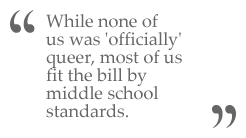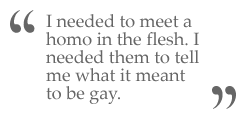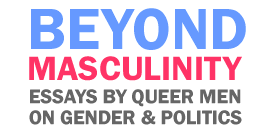 Luckily, I was not alone
in my outsider status in middle school. While no one in
my “advanced program for white people” was in such a
lowly situation as to give me – the class faggot – the
time of day, I found solace in the company of three
lovely misfits from the “regular” program. While none of
us was “officially” queer, most of us fit the bill by
middle school standards. There was Pablo, the
boisterous, decidedly fey Latino boy who adored Annie
Lennox (“Oh, ANNIE!”). Then there was Stephen, the
quiet, pear-shaped white kid who probably would have
passed as a girl if he put on a wig. The informal leader
of our little pack, though, was Sherry. Sherry was a
stick-thin black girl who, while somewhat quiet and
reserved, was terribly amused by our antics.
Luckily, I was not alone
in my outsider status in middle school. While no one in
my “advanced program for white people” was in such a
lowly situation as to give me – the class faggot – the
time of day, I found solace in the company of three
lovely misfits from the “regular” program. While none of
us was “officially” queer, most of us fit the bill by
middle school standards. There was Pablo, the
boisterous, decidedly fey Latino boy who adored Annie
Lennox (“Oh, ANNIE!”). Then there was Stephen, the
quiet, pear-shaped white kid who probably would have
passed as a girl if he put on a wig. The informal leader
of our little pack, though, was Sherry. Sherry was a
stick-thin black girl who, while somewhat quiet and
reserved, was terribly amused by our antics.
I didn’t know it at the
time, but it was through this motley group of players
that I first came into my queer sensibilities. You might
say that they gave me my first taste of faggotry. I not
only learned to like Annie Lennox from Pablo, but to
truly adore her. Simply “liking” her was not
enough; hyperbole and dramatics was requisite. Stephen
was perhaps Pablo’s theatrical opposite. His countenance
was deadpan, never betraying his surreal will to
suppress any expression of joy or pleasure. He could not
be bothered. If any 12 year old could ever be
described as jaded, it would have been him. Sherry,
meanwhile, wasn’t afraid to point out our
idiosyncrasies. She one time pulled back the bangs of my
unfortunate bowl cut, giggled, and exclaimed in her
near-whisper of a voice, “Look what’s hiding behind the
curtains!”
Perhaps emboldened by
the company that I was keeping at lunchtime, my peers
became increasingly convinced that I was this thing they
called “faggot.” Despite my pornographic predilections,
I remained skeptical. Moreover, I was terribly confused
as to how these people had any idea that I might like to
look at boys. How could they possibly know about my
desires? Granted, I had feverishly jerked off to
pictures of men having all kinds of sex, but that was in
the comfort of my own bunk bed. How could the kids at
school have any idea what went on under my sheets? Was
it my chunky, pre-pubescent body? My free expression of
emotion? Something about my gender performance gave my
peers license to jump to conclusions about the kind of
sex that I liked (or might like, since I hadn’t yet had
anything close to a sexual encounter). How could they
know when I was still so unsure?
Their conviction didn’t
stop me from trying to sway their opinion. I would find
some place deep inside to store it, to vault my
queerness away so that no one would ever find it. For my
eyes only. I tried desperately to contain whatever it
was that tipped off their gaydar. It never worked. Not
long after my humiliating assault in the hallway, about
7 or 8 white boys from my program marched over to me
during lunch period, including the guy whose foot left a
bruise just above the small of my back. The one in
charge, or perhaps the only one of them with the
temerity to ask me, demanded to know whether I “spit or
swallow.” Although my Internet explorations had
certainly revealed to me “alternative” understandings of
these words, I was quite sure that these boys must be
asking about something else entirely. I had no fucking
clue what that might be – but I knew that I had to
answer. “Swallow,” I said; it seemed as good an answer
as any. They got a good laugh out of that. They knew.
I was crushed. In
elementary school, my femininity had been embraced by
most of those around me as entertaining; I was always
the class clown. In this new, foreign environment, it
was viewed as alien and pathetic. After a few months of
taunting, lonely lunches, and even a rock thrown at my
head, I stopped skipping. In fact, I stopped smiling.
One of my teachers, who in hindsight I’m pretty sure was
gay, pulled me aside and asked me what was the matter.
“You used to be this happy go lucky kid, and now…” He
didn’t finish the sentence. He didn’t need to. How I
could I even begin to explain to him my troubles when I
couldn’t even put my finger on them?
 My only recourse, I
figured, was to find other gay men who could tell me
what lay ahead. Stephen and Pablo had certainly provided
me with a queer foundation, but none of us actually
spoke of our homo-desires. The only folks that I heard
talking about being gay were the likes of Dr. Laura and
Rush Limbaugh and other “Christian” conservatives who
blabbered on and on ad nauseam about the alleged
proclivities of homosexuals. I needed to meet a homo in
the flesh. I needed them to tell me what it meant to be
gay.
My only recourse, I
figured, was to find other gay men who could tell me
what lay ahead. Stephen and Pablo had certainly provided
me with a queer foundation, but none of us actually
spoke of our homo-desires. The only folks that I heard
talking about being gay were the likes of Dr. Laura and
Rush Limbaugh and other “Christian” conservatives who
blabbered on and on ad nauseam about the alleged
proclivities of homosexuals. I needed to meet a homo in
the flesh. I needed them to tell me what it meant to be
gay.
Far too young to go to
any bars, the Internet proved to be my only queer
resource in North Carolina. It was a few weeks after my
fourteenth birthday when I mustered the courage to meet
a guy name Goble with whom I had been chatting for
several months. He was 19 and had just moved to
Charlotte from a tiny town a few hours away called
Forest City. He must have empathized with my teenage
angst and confusion. After some negotiation, we arranged
for him to pick me up at the grocery store near my house
to spend some time hanging out with him and his friends.
They were the kind of audacious, working class Southern
queens that some would label “white trash” on account of
their polyester clothes and fiery temperaments. Most of
them had abandoned their painful, isolating family lives
in rural North Carolina to move to the big city. They
had become each other’s chosen family.
In my years spent in
their company, I would learn what being gay was all
about – at least, their kind of homo. They introduced me
to things like house music and drag. While others might
know a kind of “Tom of Finland” gay that’s all about
muscles and mustaches, their kind of Southern femme gay
was all about Steel Magnolias and Cher. It’s the
kind of twisted campy existence you might find, say, in
the cult film Sordid Lives – a kind of audacious,
bitter wit borne out of real pain and suffering. It
reveled in camp, tragedy, and attitude... (continue reading)




16 COMMENTS ON THIS ESSAY:
"Gender, at least as it is currently understood, makes free expression nothing short of impossible – for all of us."
WOW!! This line struck me more than anything-- and there was a lot about this essay that I really connected with. I think that even within the gay community, gender plays a terrible constricting role. Your examples of the Boston "bigwigs" who wanted to parade out the "acceptable" homosexuals is one way this plays out within our community.
With this project, and your writing, I'd say you are well on your way toward becoming a role-model and opinion leader for gay men, much in the grain of Eric Rofes. Sullivan, Savage, and the Queer Eye Cast don't got nothing on you, honey!!
Jason -- thank you for your kind words :)
beautiful essay.
I'm an MTF transsexual, and I live in the Philippines, so I can't say that I identify 100% with the experiences that you'e described. Still, the article is touching, and it is scarily illuminating: much of the gay culture that I've come into contact with seems all to eager to shun minorities within the subgroup that are "embarassing" or "contrary to the cause".
I loved it, keep up the good work : )
What you wrote was interesting but I really don't get what you plan on doing with your life. This and trevorhoppe.com seem more like a hobby than anything else. I would assume your are living off of your parents money to fund everything. I don't see what purpose any of this serves. Sure growing up gay is difficult. It's not accepted as normal anywhere in the world. I know it is normal because i'm gay. You have to learn some things on your own.You are feminine and so are a lot of other guys but there is not as far as I know any reason to study it. Thats what gaydar is you can pick out some hint of being feminine. What difference does being gay have to do with anything anyway? It's who you like to be with or have sex with. Try getting a job where you need to work for a year and them write about how a rich kid actually worked for a year. Paris Hilton you aren't.
Trevor,
You have impressed me greatly. Who would have ever thought after our first one or two meetings we'd still be in communication.
Although I know you think I'm the most egocentric person you ever have met, I foresee great promise and future in all of your endeavors.
You're a great man Charlie Brown. Please keep me informed of any and all published work you have forthcoming, I truly enjoy reading it all.
I miss our fights and those long lectures.... Don't tell anyone, but I may not vote R this time...
Hope you and your family are all well.
Much Love,
Burge
This is great, I loved it. It captured something I really regret about my own life - hardening up, developing sharp edges, and feeling ashamed of the gentle self I was as a child.
I'm interested as well by the response of the commenter Jeremy (above, 1 Sep 08), as it reminds me of responses to my own work on sexual racism. It seems quite strained as he labours to construct a class difference he can invoke as a reason to hate 'on' you. He really, really doesn't want anyone to ask these questions, does he? For some, the indeterminacy that we've learned to cherish is a frightening place they're keen to leave as far behind them as possible.
Daniel -- Yes, the comment from Jeremy is disingenuous at best. He makes some big assumptions about me and my life, without hesitation. I guess I never responded out of some shame that I am an academic, and a recognition that that comes out of a place of privilege. I'm not sure when the idea came around that arguments from anyone with privilege are worthless, but its surely pervasive in feminist / queer / anti-academic circles (those are separate but overlapping spheres). But one thing is clear: he had no interest in engaging the arguments, and instead decided to write a hit piece on me. That's all too often how we engage.
Hi Trevor,
That was a very eloquent essay and I was truly touched by it. Although my experiences so far in life have been very different from yours--I'm a young woman who has grown up in very open-minded communities in the North and who now identifies as "interested in people" (what most people would call bisexual)--you articulated a lot of things that have been on my mind recently and that I've discussed and tried to express with my friends. Thank you for giving my feelings words.
I just found this website and I really like the essays and messages. Good luck with everything you do in the future.
Thanks, Tamar! I hope you enjoy the other essays in the collection! And please do spread the word! xoxo
Amongst other things, as someone formally interested in web design, I wanted to say how wonderful the design of this website is. It reminds me of google in its concept- clear, clean, simple, effective, accessable- which makes it all the more beautiful. The one thing I would suggest though is that the essays themselves are inside an iframe, as to reduce loading time.
I have a slightly different interpretation of those days. However, it was interesting to read about how you perceived who I was. Your perception is very valid and made me giggle, though I feel it paints a picture that is not all that close to my actual reality at the time. Not to say that I wasn't going through similar hardship, but I think I was coming from a very different place and I took a very different path. I haven't finished the article, busy trying to memorize music, but I will finish it soon and would like to talk about this later. Cheers!
Paolo
I thoroughly enjoyed this great essay. Perhaps this is a cheap point, but it reminded me of the pain and humiliation individuals face when they fall outside of gender boundaries. It's those individuals I need to be fighting for, even more so than myself.
As an 18-year-old feminine transgender man who's interested in activism and the intersections of oppressions, I'm having a hard time finding inspiring queer male role models who critique society in the way that you do. This site--and your fantastic essay--makes me hopeful. Thank you.
Aw thanks Oliver :) I'm glad you're finding the collection useful! xoxo
Trevor, wonderful piece! You are a brilliant writer with a great voice. I agree with your closing comments that as the more extreme forms of homophobia shift to the background of our culture, they have a disproportionate impact on poorer and more rural gay populations. You are right on in your fear that the big cities may become complacent and less likely to shake the status quo. But why the attacks on Dan Savage and Andrew Sullivan? Aren't they good examples of queer, "out-there" people who are fighting for gay marriage, comprehensive sex education, and acceptance for gay youth via the "It Gets Better Project". I wouldn't paint them with the same heteronormative brush just because they've gone mainstream, they still have a lot to offer to the conversation on gender and sexual equality.
Hey David, thanks for your comment. I've mellowed out a bit politically since writing this piece. But Dan Savage I think has really repugnant politics when it comes to deviant sex, and it frustrates me. The "It Gets Better" campaign was pretty incredible - though I'd like to see half that energy put into actually getting legislation changed. But I understand that cultural campaigns like that can often have powerful effects, sometimes moreso than legal change.
Andrew Sullivan has all but repented for his neoconservative years. The work he's been doing on immigration equality has been tremendous.
Anyways, glad you've enjoyed the piece. Hope you enjoyed other ones here! xoxo